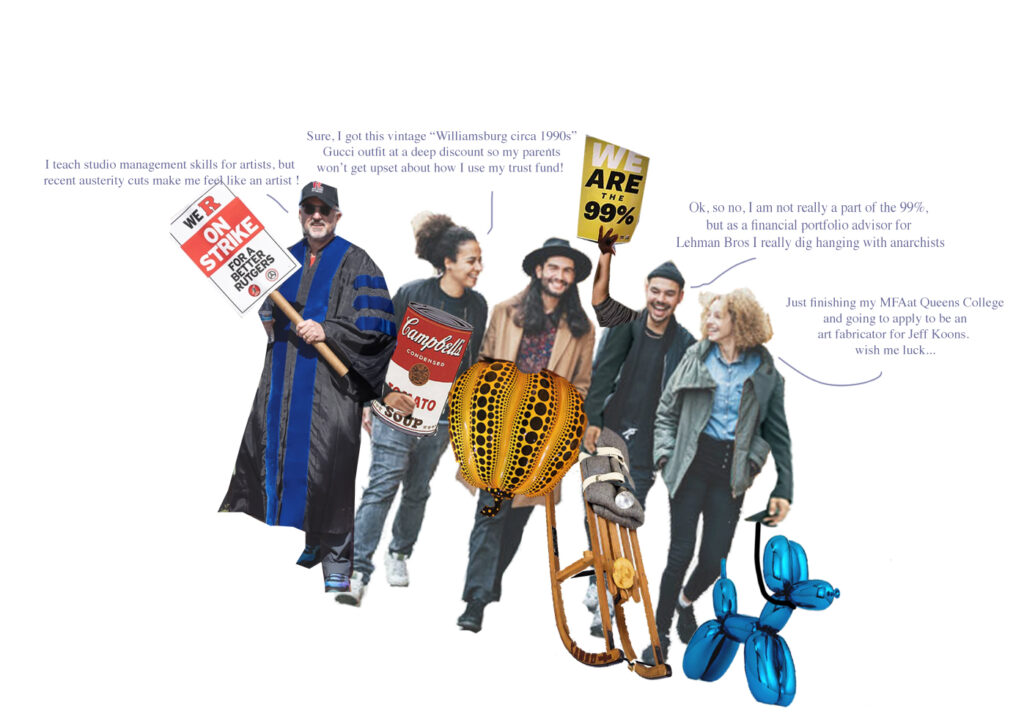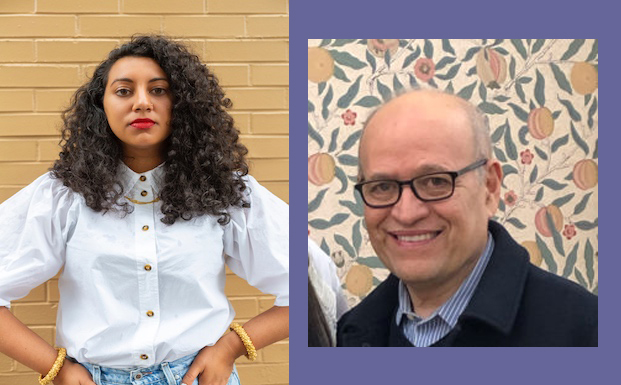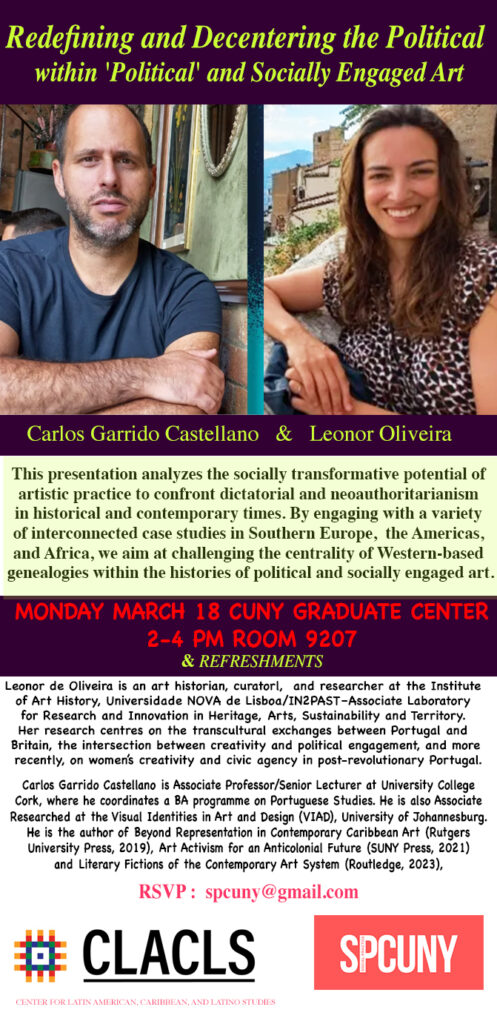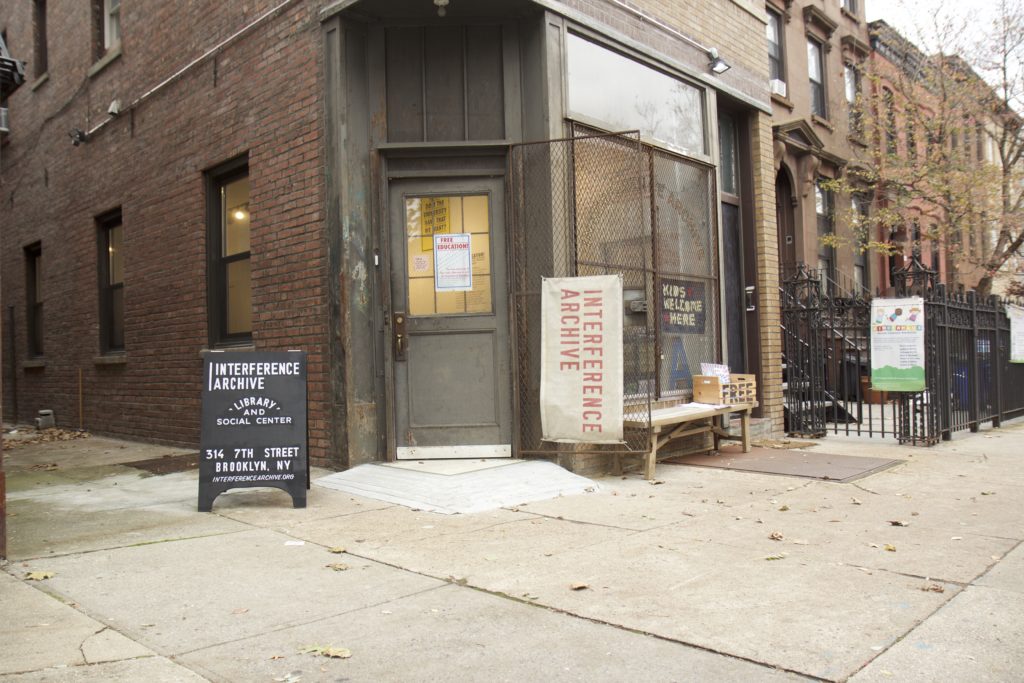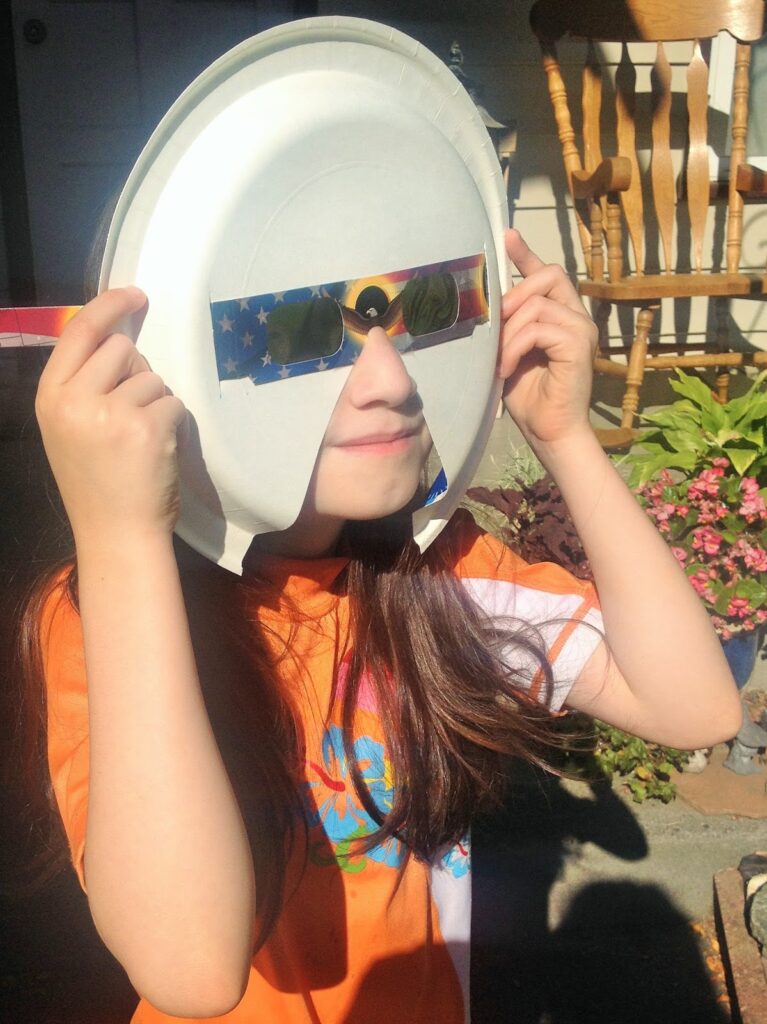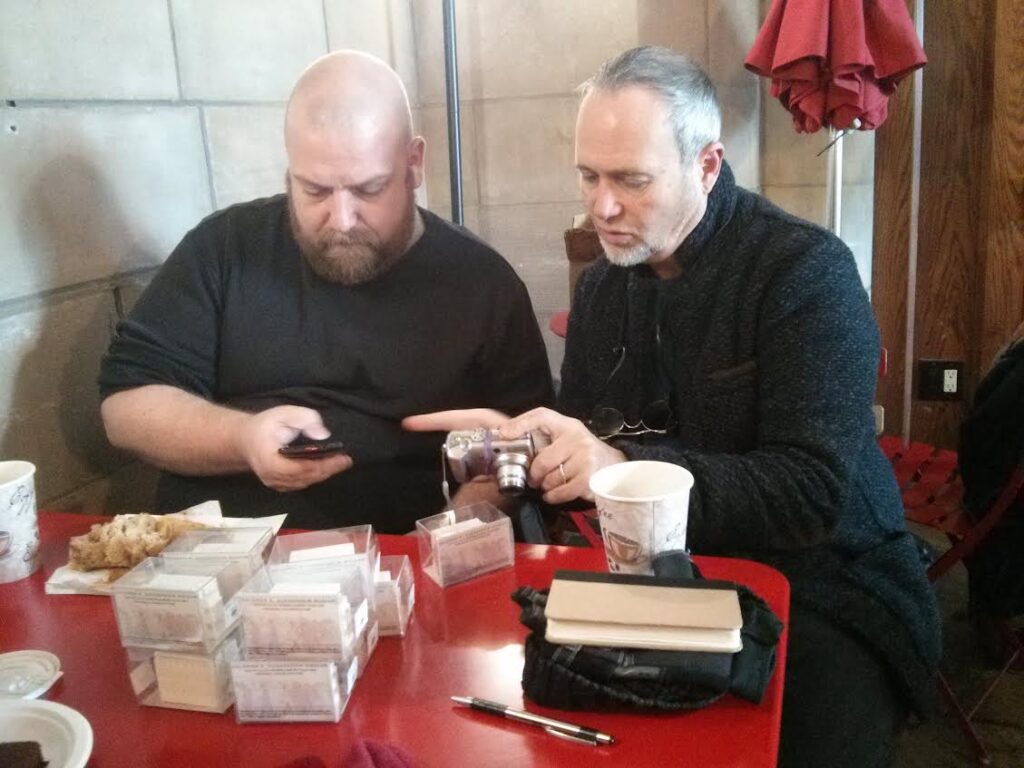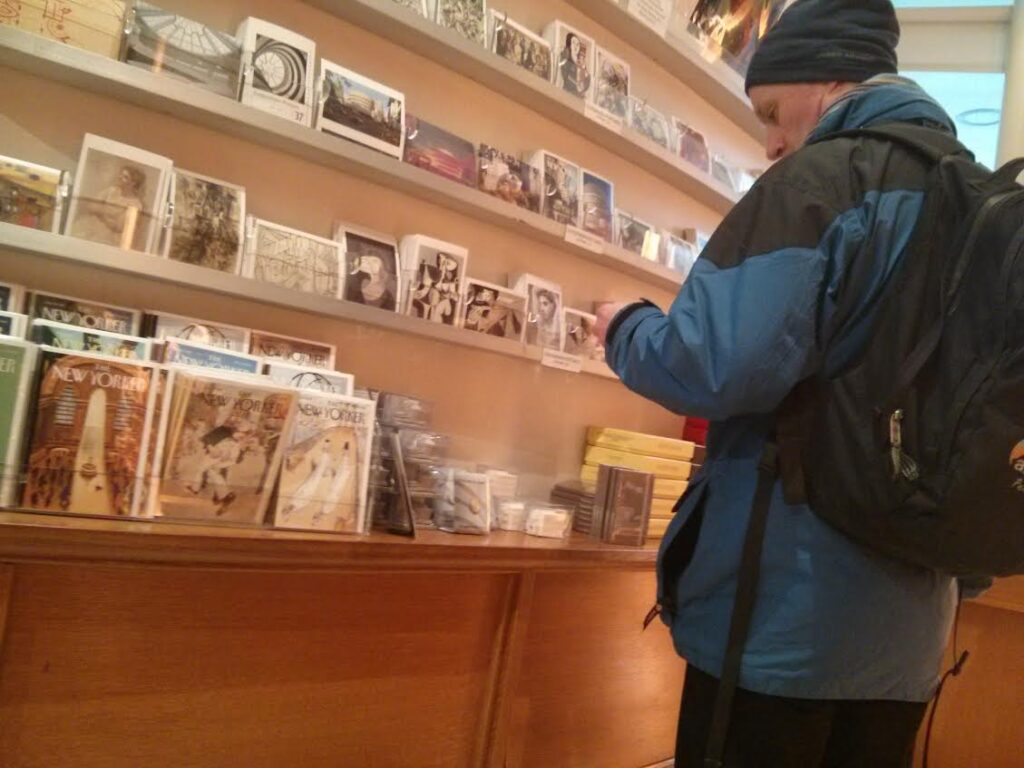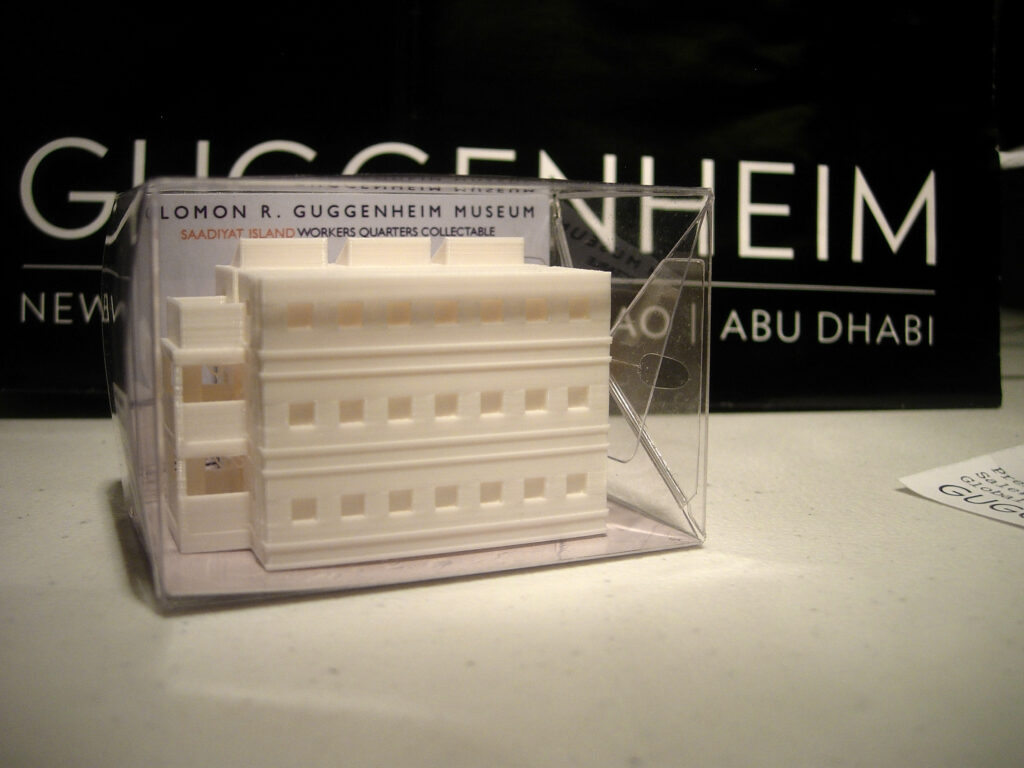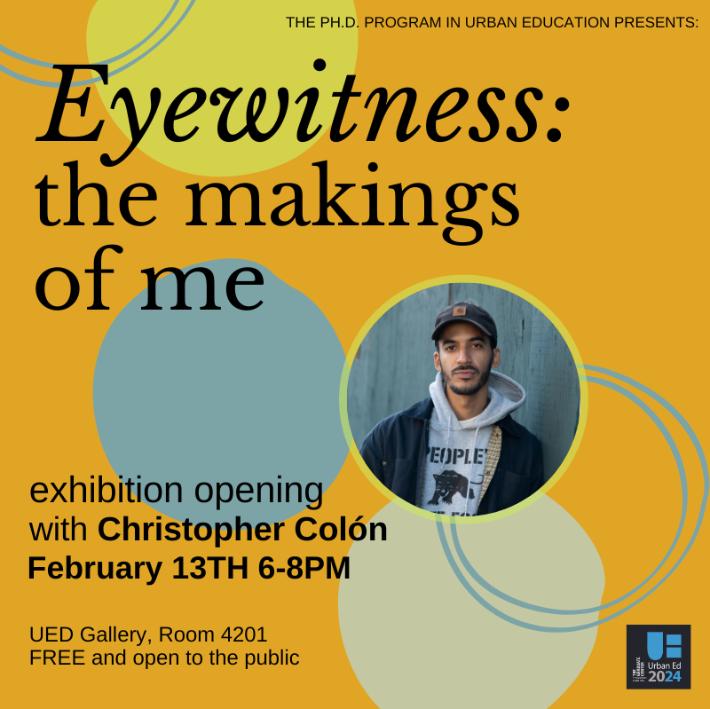================================
__________________________________
History & Theory of Socially
Engaged Art:
SPRING 2024
__________________________________
ARTS 777 + EES 79903
Mondays 2 – 5 PM
@ CUNY Graduate Center Room: 6417
Dr. Gregory Sholette
Email: gsholetteSTUDIO@gmail.com
** Syllabus and its content might be changed,
please always refer to online site as the latest version.
*** A copy of the basic syllabus is available here: CLICK

An increasing number of artists, curators, and critics have recently turned their energies toward a new type of participatory socially engaged art making. What had previously been marginalized is now gaining more mainstream attention, with a new prominence in museums, biennials, but also on the streets and other public spaces. Even the New York Times has hailed the emergence of this tendency as “social practice art.” The aim of this seminar is to survey, critique and historicize the theory and practice of social practice art as well as activist, interventionist, public, participatory and community based art operating within and across fields such as performance, urban studies, environmental science and other socially engaged disciplines. The class will focus on such questions as: Why is it useful, even necessary, to understand the history and theory of social practice art? Where should we look to find the historical roots of social practice art? Are these within the history of art, or external to it, or crossing a line between two spheres of cultural interpretation and understanding? And what is the “social”? In an increasingly privatized society how do we define and operate within a concept of the public sphere? And how are both mainstream and alternative types of cultural institutions responding to the increasing interest in socially engaged art by emerging artists? Through lectures, readings, discussions and student research presentations we will seek to position socially-engaged visual culture and the shifting role of the artist within an historical, ideological, and critical framework. If possible, guest speakers and offsite visits will also be added as available.
* Course objectives, expectations and assignments appear at bottom of page * Additional Readings and Resources are found here
__________________________________
Monday Jan 29th
Introductions & Overview of Seminar
Some origin stories about socially engaged art
Reading: Pablo Helguera -Introduction to Education for Socially Engaged Art
Reading: Introduction to “What We Made,” by Tom Finkelpearl
_________
February 5
Contemporary Art and the Professional Managerial Class
Guest Speakers: Dr. Blake Stimson, University of Illinois, Chicago
&
Dr Elise Archias, University of Illinois, Chicago
Reading: Blake Stimson, “Art and Social Death“ 2018
Reading: Luc Boltanski & Eve Chiapello “The New Spirit of Capitalism” (2002 version)
And a few more readings on the PMC: 1.) Archias 2.) Stimson 3. a response by Daniel Spaulding
Listen: A Deep Dive by Journalist into the Contemporary Art World
__________________________________
NO CLASS February 12
NO CLASS ON Monday, February 19
__________________________________
Thurs. Feb. 22 Class meets 12 NOON Room 4102
FULL COHORT MEETING
The Consolation of Social Practice Art
SPCUNY Scholar in Residence Tom Finkelpearl leads a critical discussion with Creative Time Curator, Dyia Vij , about the state of socially engaged art in 2024 based loosely on the final writings of 5th/6th century Roman philosopher Boethius (see animation) and his reflections on the shortcomings of his own life’s work as he faced execution.
Read: Ben Davis in International Socialist Review
Re-Read: Stimson, Boltanski and Chiapello
Watch: The Consolation of Philosophy by Boethius
__________________________________
No class Feb. 26 – Class meets WED Feb 28
The Sounds of Resistance
Radio, in many of its iterations, has a future in building cultural, material, and community autonomy in a time of intense mass surveillance, and the state’s failure to provide aid to marginalized communities. The spiritual and creative implications of radio are deeply entwined in this idea of resistance as well. The very fact that information is traveling through us and around us at all times and we need only a simple device to tap in and receive information is liberating when one considers the highly-monetized and heavily surveilled worlds of smartphones and social media. Radio can serve as a means for creating new platforms for information and culture for communities of people struggling to resist erasure. the medium of radio is a tool ripe for use in socially engaged art, and I argue that the only socially engaged art that matters is the type that gives agency to communities.
Lucy Hollier and Alex Suárez
__________________________________
March 4
ART in a Time of Crisis
with
Shellyne Rodriquez
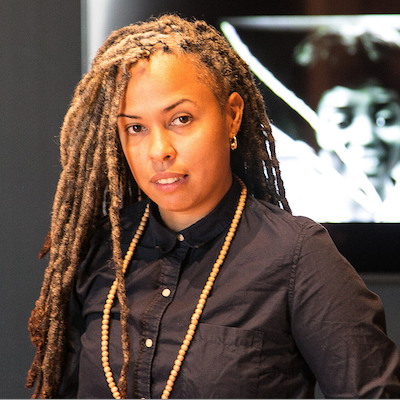
Shellyne Rodriguez is an artist, educator, writer, and community organizer based in the Bronx. Her practice utilizes text, drawing, painting, collage and sculpture to depict spaces and subjects engaged in strategies of survival against erasure and subjugation.
Readings:
decolonizing methodologies
https://nycstandswithstandingrock.files.wordpress.com/2016/10/linda-tuhiwai-smith-decolonizing-methodologies-research-and-indigenous-peoples.pdf
Black awakening in Capitalist America Robert L Allen
https://archive.org/details/blackawakeningincapitalistamerica/mode/2up
Darren walker ford foundation essay
https://www.fordfoundation.org/news-and-stories/stories/in-defense-of-nuance/
The Revolution will not be funded by Incite!
https://files.libcom.org/files/incite-the-revolution-will-not-be-funded-beyond-the-nonprofit-industrial-complex-2.pdf
top Down by karen ferguson
https://muse.jhu.edu/book/23990/
Special Guest: Shellyne Rodriguez
Reading: IA: TBA
__________________________________
March 11
Mapping Emergent Movements
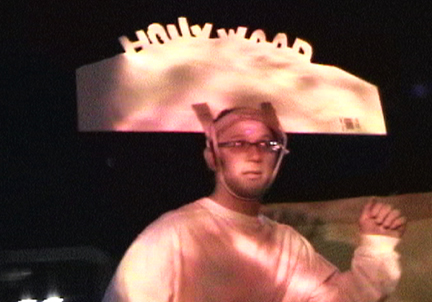
Guest artist/scholar: Robby Herbst
Our special guest Robby Herbst discusses the collective LA urban project Llano Del Rio and its activity of creating pre-figurative theory/movement forecasting, including tenant organizing, the tenant’s union, and municipalist conceptions of Los Angeles and its failed public infrastructure. The topic involves mapping emerging movements as a “social practice” or engaged critical theory making.
Browsing Material:
Related Project Websites:
Llano Del Rios’ webpage www.ldrg.wordpress.com
LA For All https://losangelesforall.org/about/
Related Reading: Accumulation by Dispossession, David Harvey
__________________________________
__________________________________
March 18
Socially Engaged Art and Neocolonial Activism
Guests: Carlos Garrido Castellano and Leonor Oliveira
Readings:
Castellano: Introduction to Art Activism for an Anticolonial Future
__________________________________
March 25
Interference Archive: A Counter-Institution
Meet Josh MacPhee at Interference Archive 314 7th St. Brooklyn
Reading: IA: Building a Counter-Institution in the USA
RECOMMENDATION BEFORE OR AFTER:
DIY Art Practices at the Brooklyn Museum
CLOSES MARCH 31
Copy Machine Manifestos: Artists Who Make Zines
__________________________________
April 1
Urbanism & Social Practice: REPOhistory
Guest: Kara Lynch (remote class today)

Readings:
REPOhistory’s collective urban interventions 1992-2000
Related Additional Readings – Urban Interventions:
The Collective Making of ABC NO RIO, Nandini Bagchee
Sholette interview with T. Cruz “Urban Policy & DNA”
Transforming Corona Plaza / Social Practice Queens, 2012
Transforming Corona Plaza Studio Presentation
Street Vendors Banned then Returned to Corona Plaza, 2023
Article about Immigrant Movement International (IMI)
__________________________________
—
April 8
RECOMMEND HAVING A PAIR OF SOLAR ECLIPSE GLASSES WITH YOU TODAY !
Guest: Coco (Conor) Tomás Reed of the Shape of Cities to Come Institute,
BIO: https://www.shapeofcitiestocome.org/people
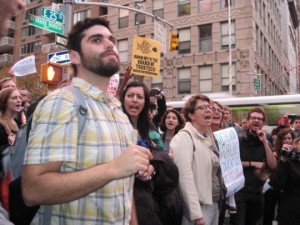
Here are some materials for folk to check out:
– New York Liberation School intro – a short film about Louis Reyes Rivera Harlem University: “Are You with Me?” and 2011 Occupy student strikes- A Spring 2023 study group syllabus bridging abolitionist and university struggles- Shape of Cities to Come Institute website and Instagram
__________________________________
We Will Visit Chris’s Exhibition This Week or Next
__________________________________
April 15
Who Builds Your Architecture?: About Gulf Labor Coalition /G.U.L.F.
Saadiyat Island Workers Quarters Collectable Shop Drop at Guggenheim 2013
__________________________________
NO CLASSES – April 22 to April 30 – SPRING BREAK
__________________________________
May 6
Projects and Ongoing Research Reviews
Possible Guest Reviewer
Visit Christopher Colon’s exhibition GC Room 4201
__________________________________
May 13
Projects and Ongoing Research Reviews FINAL and PARTY
** We Meet at Creative Time HQ at 59 East 4th Street right off of the Bowery on the 7th Floor **

- CLASSES AT A GLANCE THIS SEMESTER:
- January 29
- February 5
- NO CLASS February 12
- NO CLASS ON Monday, February 19
- Thurs. Feb. 22 Class meets for FULL COHORT MEETING
- No class Feb. 26 – Class meets WED Feb 28
- March 4
- March 11
- March 18 – GC Room 9207
- March 25 – At Interference Archive, Brooklyn
- April 1
- April 8
- April 15
- NO CLASSES – April 22 to April 30 – SPRING BREAK
- May 6
- May 13
- May 20 – At Creative Time HQ, LES
__________________________________
Learning Goals & Course Outcomes
# Develop theoretical and historical knowledge of emerging social practice art field.
# Explore and debate complexities, paradoxes and possibilities of socially engaged art.
# Engage in original research related to social practices and individual student projects.
# Foster an environment for investigating cross-disciplinary exchange and critical thinking.
# Acquire working knowledge of seminal texts relevant to this field and in relation to the broader background of art history.
Five Research Questions this Course will Attempt to Answer
1. The definition question: How does social practice differentiate
itself from social service ? Is this important to resolve? What kind of
questions and assumptions arise if we seek to make social practice its own
distinct artistic method? And what sort of questions and assumptions arise if we do not differentiate it from art or from say, community work, environmental activism, urban reform, or social justice advocacy?
2. The institutionalization/academic question: Is social practice art
radically opposed to mainstream art and culture? Is it rejuvenating it? Or is
it being co-opted by it? How can we frame this question to get beyond simple answers and find a more engaging and useful thesis from which to work?
3. The context question: Who is a social practice artist and what sort
of “agency” does she or he have in a world of hyper-surveillance and economic ? And who is such work made for and why? Is it global or local, white or black, academic, or populist? Does it have a specific historical framing? Is it logical to assume it will be part of future arts academic curricula and how will this alter the study of art and of art criticism, history, curating, etc..?
4. The “aesthetic” question: Is there a social practice art-aesthetic or form or repertoire of forms specific to this kind of work? If yes, what kind of questions do we need to ask in order to investigate what this particular aesthetic consists of? And if there is no such thing as a social
practice aesthetic how will this “lack” impact the practice of social practice
art if at all?
5. The organizational question: the practice of social practice art, as opposed to many other types of artistic practice, inevitably involves processes of organization, administration, and self-governance. What precedents exist regarding this conjoining of artistic and organizational needs and goals, and does a distinctive hybrid of some type emerge from this entanglement?
& Five Evaluative Concepts for determining the presence of a “work of art” (these might be useful for your research and projects):
1. INTENTION – the artist means for the project [the work/performance/event/etc…] to be grasped as a work of art
2. ART-CENTRICITY – artistic concerns or activities are a central concern of the project including para-fictionality and pre-figuration.
3. INSTITUTIONALITY – the project is readable within the discourse and power relations of art industry/art history, criticism & theory
4. WORLDING / WORLD BUILDING – the project’s methods draw upon, explore, and/or expand a uniquely artistic world view or approach to research or expression or making.
5. TRESPASSING – Rick Lowe’s term for mimicry & border-crossing visual art carries out into other disciplines, parts of society or the world.
Assignments and Expectations
A. Generate at least one question for each week’s guest based upon readings and your own research.
B. Make one short (ten minute) presentation during the course of the semester in consultation with instructor.
C. Submit a Final Project last 2 – 3 weeks of semester (two options):
1. Create a performance, situation, exchange for the class tbd.
OR
2. Write a review of a book, extended essay tbd. * This can be the basis of
your short presentation. *
Grading and Requirements
You are responsible for reading and discussing all assigned texts. Attendance is essential due to the participatory nature of this course. All students are expected to come to class prepared and on time.
If a problem arises regarding attendance or assignments, you should
contact me as soon as possible. Missing a class does not mean that you are excused from an assignment. In short, participation and attendance figure heavily in your overall evaluation and grade.
Evaluation:
30% Participation in class
30 % Class presentation
40% Final Project
More About the Final Project Options:
1.) an artistic work based on research and knowledge gained during our seminar. This project needs to be accompanied by documentation of research in the form of a short description of the piece and a bibliography of research references (that must include some written material, three minimum, but can also cite art works, musical compositions, performances etc…)
2.) A second option is to write a book review of 1500 – 2000 words focused on a book or extended academic essay related to the class in general, or about a particular practitioner of socially engaged art. Your review should consist of 1500 – 2000 words and accomplish these objectives: 1.) Summarize why the book/essay is important including what its arguments are and how it relates to socially engaged art. 2.) How does this particular book contribute to the field of art, socially engaged practices, improving society? 3.) Does the author(s) achieve what they set out to do and does their argument make sense? Additional notes: if you quote the author be sure to add the page number of the citation inside (parentheses). For more details see: BOOK REVIEW GUIDELINES, and be sure to use this format below for the title of your review:
Title and Subtitle [Upper case and boldface]. Author(s) or Editor(s). Place of Publication: Name of Press, Date. pp.[both Roman and Arabic numerals]; maps, diagrs., ills., notes, bibliog., index [include these as appropriate].
Geographies of Mars: Seeing and Knowing the Red Planet. K. Maria D. Lane. Chicago, IL: University of Chicago Press, 2011. xiii and 266 pp., maps, photos, diagrams, illus., notes, bibliog., index.
CUNY Boiler Plate:
CUNY POLICY ON ACADEMIC INTEGRITY
The Policy on Academic Integrity, as adopted by the Board is available to all candidates.
Academic Dishonesty is prohibited in The City University of New York and is punishable by penalties, including failing grades, suspension, and expulsion. This policy and others related to candidates’ issues are available to you at: http://qc.cuny.edu/?id=IUHC
USE OF CANDIDATE WORK
All teacher education programs in New York State undergo periodic reviews by accreditation agencies and the state education department. For these purposes, samples of candidates’ work are made available to those professionals conducting the review. Candidate anonymity is assured under these circumstances. If you do not wish to have your work made available for these purposes, please let the professor know before the start of the second class. Your cooperation is greatly appreciated.
REASONABLE ACCOMMODATIONS FOR CANDIDATES WITH DISABILITIES
Candidates with disabilities needing academic accommodation should: 1) register with and provide documentation to the Special Services Office, Frese Hall, Room 111; 2) bring a letter indicating the need for accommodation and what type. This should be done during the first week of class. For more information about services available to Queens College candidates, contact: Special Service Office; Director, Miriam Detres-Hickey, Frese Hall, Room 111; 718-997 5870 (Monday – Thursday 8:00 a.m. to 5:00 p.m. & Friday 8:00 a.m. to 4 p.m.).
______________________________________________


